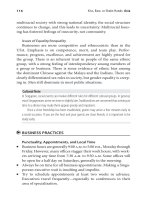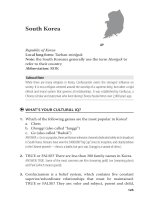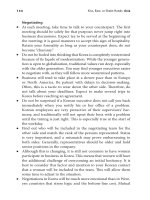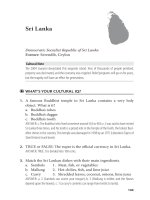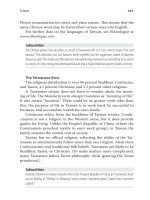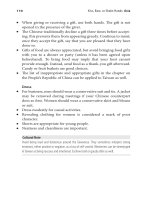Tài liệu How to Do Business in 12 Asian Countries 9 doc
Bạn đang xem bản rút gọn của tài liệu. Xem và tải ngay bản đầy đủ của tài liệu tại đây (120.85 KB, 9 trang )
sex in public—even if you are husband and wife. On the other
hand, contact between people of the same sex is permitted. Men
may hold hands with men or even walk with their arms around
each other; this is interpreted as nothing except friendship.
●
Among both Muslims and Hindus, the le hand is considered
unclean. Eat with your right hand only. Where possible, do not
touch anything or anyone with your le hand if you can use your
right hand instead. Accept gis and hold cash in the right hand.
(Obviously, when both hands are needed, use them both.)
●
e foot is also considered unclean. Do not move anything with
your feet, do not point with your feet, and do not touch anything
with your feet. Feet should not be rested on tables or desks.
●
Do not show the soles of your feet or shoes. is restriction deter-
mines how one sits: you can cross your legs at the knee but not
with one ankle on your knee.
●
Pounding one st into the palm of your other hand is an obscene
gesture among some Indonesians.
●
e head is considered the seat of the soul by many Indonesians.
Never touch someone’s head, not even to pat the hair of a child.
●
As in much of the world, to beckon someone, you hold your
hand out, palm downward, and make a scooping motion with the
ngers. Beckoning someone with the palm up and wagging one
nger can be construed as an insult.
●
It is impolite to point with your forenger. Point with your right
thumb and a closed st (like a hitchhiker). is gesture is also
used to mean “you go rst.”
●
Standing tall with your hands on your hips—the “arms akimbo”
position—is always interpreted as an angry, aggressive posture.
Indeed, this position is used as a ritualized symbol of anger in the
Indonesian wayang (shadow puppet) theater.
Gifts
●
Gi giving is a traditional part of Indonesian culture. Although
gis may be small, they are oen exchanged.
●
Gis can celebrate virtually any occasion: when you return from a
trip, when you are invited to an Indonesian home, when a visitor
Indonesia 53
54 Kiss, Bow, or Shake Hands: Asia
comes to tour your oce or workplace, and in return for services
rendered.
●
It is not customary to unwrap a gi in the presence of the giver.
To do so would suggest that the recipient is greedy and impatient.
Worse, if the gi is somehow inappropriate or disappointing, it
would embarrass both parties. Expect the recipient to thank you
briey, then put the still-wrapped gi aside until you have le.
●
Food makes a good gi for most occasions. When a person visits
an area of Indonesia where a delicacy is available, he or she is
expected to bring some back for friends.
●
Pork and alcohol are prohibited to observing Muslims, so do not
give them as gis to Indonesians. Other foods may be appropriate,
although meat products must be halal (the Muslim equivalent of
kosher). e prohibition against pork and alcohol also precludes
pigskin products and perfumes containing alcohol.
●
Muslim Indonesians consider dogs unclean. Do not give toy dogs
or gis with pictures of dogs.
●
Pets that are prized by Indonesians include cats and birds, espe-
cially songbirds. Recordings of the songs of champion songbirds
are distributed, and may make a good gi for an Indonesian bird
fancier.
●
Remember that personal gis from a man to a woman can be
misinterpreted as romantic oerings. When a foreign business-
man gives a gi to an Indonesian woman, he must let everyone
know that he is simply delivering a gi from his company, or his
wife.
●
For information on gi giving to ethnically Chinese contacts, see
the chapter on China.
●
Observant Hindus do not eat beef or use cattle products. is
eliminates most leather products as appropriate gis.
Dress
●
Indonesia straddles the Equator, and thus is hot and humid all
year long. Most of the lowlands have a daytime temperature range
of 75 to 95°F, and humidity around 75 percent.
●
Lower temperatures occur only in the mountainous areas.
●
e rainy season runs from September through February, but sud-
den showers occur all year long. Some people carry an umbrella
every day.
●
Because of the heat and humidity, business dress in Indonesia is
oen casual. Standard formal oce wear for men is dark trousers
and a light-colored long-sleeved shirt and tie, without a jacket.
Many businessmen wear a short-sleeved shirt with no tie.
Businesswomen wear long-sleeved blouses, skirts, busi-
ness suits, and more recently, pantsuits. e colors should by
dark and muted; bright, vivid colors are not appropriate for a
businesswoman.
●
As a foreigner, you should dress more conservatively until you are
sure what degree of formality is expected. Men should expect to
wear a suit jacket and tie, and remove them if it seems appropriate.
Whatever you wear, try to stay clean and well groomed—which is
a feat in the tropics.
●
Many Indonesian men wear an open-necked batik shirt to work.
is is also popular for casual attire. Jeans are good for casual
wear, but shorts should be avoided.
In deference to Muslim and Hindu sensibilities, women should
always wear blouses that cover at least their upper arms. Skirts
should be knee-length or longer.
Cultural Note
Three calendars are in common use in Indonesia. The Western (or Gregorian) calendar is the
official calendar. Islamic holidays are dated by the Arabic calendar, which loses approximately
eleven days each year against the Western calendar. In addition, there is a Hindu-influenced
Javanese calendar.
When certain days from different calendars coincide, it is considered lucky. For example,
when the fifth day of the Western week falls on the fifth day of the Javanese week (which is
only five days long), the occasion is considered auspicious.
Indonesia 55
56
Japan
Japan
Cultural Note
The term “Japan Inc.” has often been used to describe the totality of Japanese business: the
tight government control; the huge, interlocking corporate alliances; the hard-working salary
men who began each day by singing the company song and getting lifetime employment in
return for their loyalty; the postwar Japanese economic miracle. But “Japan Inc.” was always
an exaggeration, and a decade of poor economic performance has just about ended the
myth.
However, business is still conducted differently in Japan than in North America or the EU.
The Japanese still prefer to do business in a network of old friends, facilitated by favors and
obligations.
●
3
WHAT’S YOUR CULTURAL IQ?
1. TRUE or FALSE? Within a generation or two, Japan may have its
rst female emperor.
ANSWER: TRUE. Although Japan has historically had male emperors, there has not been a
male born into the Japanese royal family for some forty years. The current heir to the throne,
Crown Prince Naruhito, has a daughter as his heir, which may force the change in tradition.
2. More than y-ve years aer the end of the Second World War,
one of the following Japanese islands remains occupied by a for-
eign power. Which one is it?
a. Hokkaido
b. Kurile Islands
c. Okinawa
ANSWER: b) As of this writing, Russia remains in control of the Kurile Islands, which the
Japanese refer to as the Northern Territories. Russia’s refusal to return the islands is the reason
Japan has never signed a formal peace treaty ending the Second World War with Russia (or
with its predecessor, the USSR). Although the USA maintains a controversial military base on
Okinawa, it returned the island itself to Japanese control.
3. e Japanese have at least ten distinct breeds of dogs. TRUE or
FALSE? e Japanese Tosa makes a ne lap dog for the many
Japanese who live in small apartments.
ANSWER: FALSE. The Tosa is a large dog, originally bred for dog fighting and nicknamed the
“Japanese Mastiff.” The lap dog bred for upper-class Japanese ladies is the Chin.
●
3
TIPS ON DOING BUSINESS IN JAPAN
●
A “poker face” is of great use in Japan. e Japanese dislike strong
public displays of emotion. If you show shock or anger during
business negotiations, they will believe that you lack self-control
and are questionable as a business partner.
●
e Japanese negotiate in groups, usually in a team containing
executives of dierent age ranges. Your team should have at least
one senior member, and everyone must be sure to treat him with
deference.
●
e younger members of your team should generally remain
quiet and defer to their seniors during the meetings. eir real job
will be to go out drinking with the Japanese team’s young execu-
tives at night. e Japanese like to convey important information
(e.g., “Our boss was very angry at your oer today”) via junior
executives.
●
It is useful to get Japanese executives away from their home base.
In Japan, they can wait you out, hoping that you will agree to a
disadvantageous deal because you are anxious to go home. e
Japanese oen agree to hold negotiations at a midway point. For
example, when negotiating with North Americans, the Japanese
oen agree to hold meetings in Hawaii.
●
Hard-sell techniques will fail in Japan. Instead, nd the points on
which you and your Japanese counterparts agree, then build upon
those. A positive, persuasive presentation works better with the
Japanese than does a high-pressure, confrontational approach.
Japan 57
58 Kiss, Bow, or Shake Hands: Asia
●
e Japanese may ask international visitors many questions—
including information about your job, your title, your age, your
responsibilities, the number of employees that report to you, etc.
Japanese is a complex language with many forms of address and
honorics. ey need a lot of information in order to decide which
form to use when speaking to you. (Most of this subtlety will be lost
when translated into English, but it is important to the Japanese.)
Cultural Note
Japan is deficient in many important resources, especially petroleum. One of the reasons the
Japanese attacked the Western powers in the Pacific in the Second World War was to secure
supplies of petroleum from Dutch Indonesia. Japan remains an importer of petroleum, and
any disruption of oil supplies causes instability in the Japanese economy.
●
3
COUNTRY BACKGROUND
Demographics
Japan’s population is approximately 127 million (2006 estimate).
is dense population is cited as the prevailing factor explaining the
Japanese “group mentality.” e following statistics are useful for under-
standing just how crowded Japan is: Its land represents only 0.3 percent
of the world’s land mass, yet its people represent 3 percent of the world’s
population. Over 99 percent of the population consists of native-born
Japanese. e largest minority (less than 1 percent) are Koreans.
History
e Japanese Islands have been occupied for thousands of years.
e dynasty of the current emperor is said to have been founded in
660 ..
Historically, Japan has resisted outside inuences and frequently
closed itself to foreigners. e United States of America forcibly
opened Japan to foreign markets in 1853 when Commodore Perry
sailed his war eet into Tokyo Bay.
What Westerners consider World War II was only part of a long-
running Asiatic war in which Japan invaded neighboring nations.
Korea was annexed in 1910, Manchuria was annexed in 1931, and
China proper was invaded in 1937.
Japan surrendered to the Allies in 1945, and was occupied until
1952. e USA, wishing to demilitarize and democratize Japan,
imposed many reforms aer World War II. ese eorts included
a decrease in the power of the emperor and decentralization of the
government. Subsequently, the Japanese recentralized much of their
government. Japan’s bureaucracy of civil servants became just as
powerful (if not more) than its elected ocials.
Devastated by the war, the Japanese rebuilt their factories and
infrastructure. Japan’s economy boomed in the 1970s and 1980s.
During this time, cash-rich Japanese bought property and businesses
all over the world. is boom ended in the 1990s.
Since then, the Japanese economy has largely been in a state of
stagnation. Unable to continue providing traditional lifetime employ-
ment, many Japanese workers were laid o. is breaking of the
postwar social contract has caused a major change of attitude among
many Japanese.
Recently, the government led by Prime Minister Junichiro Koi-
zumi has made some painful changes to the economy. While this
resulted in economic improvement in 2003, it remains to be seen if
this recovery will be sustained.
Cultural Note
Both foreign and domestic companies are expected to offer apologies for wrongdoing in Japan.
In October of 2004 Japan’s bank regulatory department, the Financial Services Agency, ordered
Citigroup to close its private banking business for fraudulent transactions. Citigroup subsequently
flew the company’s chief executive officer to Japan to hold a press conference. During the
conference, he bowed deeply and apologized for his company’s “failure to comply with legal and
regulatory requirements in Japan.” His apology was broadcast on Japanese television, and it was
viewed as an important first step in repairing its reputation with regulators and customers.
Type of Government
Japan is a parliamentary democracy under a constitutional mon-
arch. e chief of state is the emperor; Emperor Akihito was crowned
Japan 59
60 Kiss, Bow, or Shake Hands: Asia
in 1990 aer the death of his father, Emperor Hirohito. e head of
the government is the prime minister.
Power within the government resides mainly in the prime minis-
ter, who is the leader of the majority party of the Diet, or Parliament.
e prime minister dissolves the House of Representatives every two
or three years. e prime minister also appoints the Supreme Court
and leads the Cabinet.
e Diet is made up of two houses, the House of Representatives
and the House of Councilors. Both are elected, with the House of
Representatives having more authority. Finally, the Cabinet is respon-
sible to the Diet. In the Cabinet, it is the Ministry of Finance (MOF)
and the Ministry of International Trade and Industry (MITI) that are
the most important.
MITI, through involvement in business and industry following
the Second World War, helped Japan gain its strength. Today MITI
does not have the same authority it once did, both because it is not
as needed as much as before and because of pressure from other gov-
ernments (such as the United States of America). e government
does not control industry; government ministries instead serve as
intermediaries and as think tanks.
For current government data, visit the Embassy of Japan at www
.us.emb-japan.go.jp.
Cultural Note
Japanese uses not one but three different forms of writing: kanji, katakana, and hiragana.
As a rule, kanji represents blocks of meaning. Katakana is used for foreign names and words.
Hiragana expresses the grammatical relationships between words.
As a foreigner, your name and your company’s name will probably be written in katakana
characters.
Language
Japanese is the ocial language of Japan. It is a complex and subtle
language, spoken nowhere else in the world as a primary tongue.
Most sentences in Japanese can be expressed in at least four dierent
levels of politeness. Japanese women almost always use one of the more
deferential forms. Communication in Japan is oen marked by great
subtlety; information is le unspoken yet is perfectly understood.
Ethnologue.com has identied een languages currently spoken
in Japan. ese range from Korean (with some 670,000 speakers) to
Ainu (with just 15 active speakers).
Cultural Note
Literacy is close to 100 percent in Japan, and 95 percent of the population has a high school
education. The Japanese educational system includes difficult qualifying exams that students
must pass, which puts enormous pressure to study and to get good grades. Once a student
has passed the entrance exam for college, however, exams are over. Students accepted to the
top colleges are almost guaranteed top jobs.
All Japanese students begin classes in English around age twelve. However, the goal for
students of English is to pass their exams rather than to learn to verbally communicate in
English. Although many Japanese learn to read English, fewer are able to speak with English-
speaking foreigners.
Reflecting the increased influence of China, some Japanese are now studying Mandarin
Chinese as their second foreign language.
The Japanese View
e Japanese have a unique culture and language. Despite increas-
ing scientic evidence, many Japanese believe that they are geneti-
cally unique as well. (One good way to make yourself unpopular in
Japan is to quote studies that indicate the Japanese are descended
from immigrants from mainland Asia.) Foreign pharmaceuticals are
oen prohibited in Japan on the basis that they have not been proven
to be safe and eective for the Japanese people.
Wherever the Japanese originated, they are extremely protective
of their culture and their society. ey discourage large numbers of
foreigners from coming to work and live in Japan. Even Korean work-
ers who have lived in Japan for several generations are not accorded
full citizenship. Foreigners in Japan are oen considered to be the
source of crime and public disorder.
Japan 61



